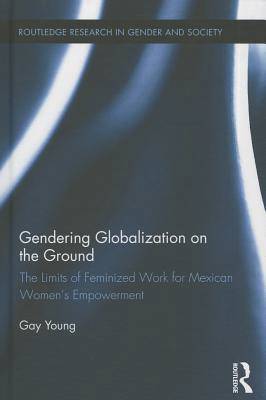
- Afhalen na 1 uur in een winkel met voorraad
- Gratis thuislevering in België vanaf € 30
- Ruim aanbod met 7 miljoen producten
- Afhalen na 1 uur in een winkel met voorraad
- Gratis thuislevering in België vanaf € 30
- Ruim aanbod met 7 miljoen producten
Gendering Globalization on the Ground
The Limits of Feminized Work for Mexican Women's Empowerment
Gay YoungOmschrijving
How has globalization worked for women working on the frontlines of neoliberalism on the Mexico-US border? This border divides "US" from "Others," and produces social inequalities that form a site where marginalized border women encounter the othering power of neoliberalism and confront inequalities of gender and class. Within this context, a critical comparison of socially similar women, working either in export production industries or in small-scale commerce and low-level services in Ciudad Juárez, reveals how export factory work constrains women's empowerment at home - as well as the wages they earn and the well-being of their households. This volume challenges the neoliberal rationale of "empowering" women to support market growth, and argues instead for understanding women's empowerment as a process of transformation from disempowerment by gender power relations to challenging masculinist domination in households and, ultimately, the economy and society. Because structures of gender and globalization are mutually constituted, women's empowerment as gender democracy is integral to producing alternative, democratic globalization. Using a feminist methodology that gives attention to the standpoint of women located on the downside of social hierarchies and takes into account strategically diverse points of view, this study develops analysis to counter neoliberal globalization as it touches down in the lives of ordinary women and men on the border and beyond.
Specificaties
Betrokkenen
- Auteur(s):
- Uitgeverij:
Inhoud
- Aantal bladzijden:
- 260
- Taal:
- Engels
- Reeks:
- Reeksnummer:
- nr. 44
Eigenschappen
- Productcode (EAN):
- 9781138809826
- Verschijningsdatum:
- 1/11/2014
- Uitvoering:
- Hardcover
- Formaat:
- Genaaid
- Afmetingen:
- 155 mm x 231 mm
- Gewicht:
- 476 g

Alleen bij Standaard Boekhandel
Beoordelingen
We publiceren alleen reviews die voldoen aan de voorwaarden voor reviews. Bekijk onze voorwaarden voor reviews.











